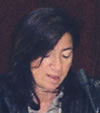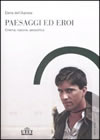Introducing Elena dell’Agnese
 Elena dell’Agnese holds a Master’s degree in Geography and is currently Professor in Geography at the University of Milano-Bicocca.
Elena dell’Agnese holds a Master’s degree in Geography and is currently Professor in Geography at the University of Milano-Bicocca.
Her research interests include American, critical and popular geopolitics. She further examines the history of critical geography.
Geopolitical Passport
Your relationship with geopolitics
At what age did you discover geopolitics and what attracted you to it?
I don’t know if you can define Claude Raffestin’s “Pour une geographie du pouvoir” a geopolitical book – if so, I discovered geopolitics very early, as an undergraduate student.
Which geopolitical topics have your focus and why did you choose especially these?
I like the connection between power-knowledge and geopolitics, for this reason I am interested in popular geopolitics, formal geopolitics and their connections with the making of geopolitical imagination.
What do you consider your most important contribution to geopolitics?
As far as the history of geopolitics is concerned, I rediscovered the work of a (currently) semi-unknown American author from the Nineteenth Century, called William Gilpin. In 1944, he was called “the first American geopolitician.” I have published an essay on his geopolitical model into an Italian book, which I am now reworking for an international journal.
I have also been working on the history of critical geography, in Italy and France, and on its connection with Anglo-American critical geopolitics (see Sage handbook of political geography, 2008). On the popular geopolitics side, I have recently published a book (in Italian) on the connection between popular films, nationalism and International Relations (“Paesaggi ed eroi. Cinema, nazione, geopolitica”, UtetLibreria, 2009).
My geopolitical preferences
What is your favourite definition of geopolitics?
Someone, probably the French author Foucher, once defined geopolitics as “the analysis of power relations between groups identifying themselves on a territorial basis.” That’s my favourite definition, because it speaks about peoples and territories, but not about states.
Which geopolitical scientist do you admire the most?
In the past? If so, I like William Gilpin, for his vision of a future where geopolitical relations were going to be shaped by interconnectedness and communication, and not by war (he was writing in 1890).
Among living authors, my favourite one is by far Claude Raffestin, who was capable of understanding the importance of Foucault’s ideas as a contribution for geopolitics and geography already at the end of the 1970s.
What is your favourite geopolitical book?
I like very much “Geopolitics. Re-visioning world politics”, by John Agnew.
What is your favourite geopolitical website?
None
The geopolitical future
In what direction(s) will geopolitical science be heading the coming decades?
It will probably remain in the tradition of post-structural approaches and critical studies, maybe developing a more defined attitude in research methods.
Which geopolitical subject has been too little in the spotlight and needs further research?
The role of different organisations of power, which can be active inside the State, and manipulate the geopolitics of the State, without being the State. I am thinking of the Freemasonry, the Catholic Church, the many mafias in the world.
What will be the largest geopolitical challenge for the world in the 21st century?
Finding an equilibrium between old declining forces (such as the US) and new emerging ones (such as India, China and why not Indonesia).

